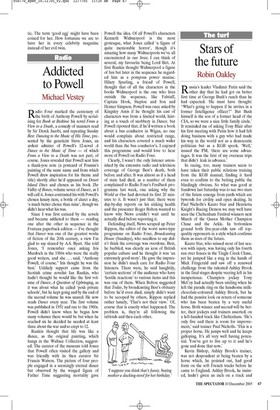Radio
Addicted to Powell
Michael Vestey
Radio Four marked the centenary of the birth of Anthony Powell by serialising for Book at Bedtime his novel From a View to a Death, a comedy of manners read by Sir Derek Jacobi, and repeating Sunday Best: Dancing to the Music of His Time, presented by the geneticist Steve Jones, an ardent admirer of Powell’s 12-novel A Dance to the Music of Time — of which From a View to a Death was not part, of course. Jones revealed that Powell sent him a thank-you note (a postcard of Poussin’s painting of the same name and from which Powell drew inspiration for his theme and title) shortly after he’d appeared on Desert Island Discs and chosen as his book The Valley of Bones, volume seven of Dance, as I will call it. Jones contrasted his with Powell’s chosen luxury item, a bottle of claret a day, ‘a much better choice than mine’, though we didn’t hear what his was.
Since I was first enticed by the novels and became addicted to them — reading one after the other in sequence in the Fontana paperback edition — I’ve thought that Dance was one of the greatest works of fiction of the 20th century, a view I’m glad to say shared by A.S. Byatt. She told Jones, ‘I remember once asking Iris Murdoch in the 1960s who were the really good writers, and she ... said, “Anthony Powell, of course.” Iris thought he was the best.’ Unlikely support came from the Scottish crime novelist Ian Rankin, who hadn’t thought he would like the first volume of Dance, A Question of Upbringing, as it was about what he called ‘posh private schools’, but he kept going and by the end of the second volume he was snared. He now reads Dance every year. The first volume was published in 1951 and ran to the 1960s. Powell didn’t know when he began how many volumes there would be but when he reached six he decided he needed at least three about the war and so crept to 12.
Rankin thought that life was like a dance, as the original painting, which hangs in the Wallace Collection, suggested. The curator of the museum told Jones that Powell often visited the gallery and was friendly with its then curator Sir Francis Watson. The picture of four people engaged in a seemingly eternal dance but observed by the winged figure of Father Time suggesting mortality gave Powell the idea. Of all Powell’s characters Kenneth Widmerpool is the most grotesque, what Jones called ‘a figure of quite memorable horror’, though it’s amazing how many Widmerpools we’ve all encountered in our lives; I can think of several, my favourite being Lord Birt. At first Rankin thought Widmerpool a figure of fun but later in the sequence he regarded him as a pompous power maniac. Hilary Spurling, a friend of Powell, thought that of all the characters in the books Widmerpool is the one who lives outside the sequence, like Falstaff, Captain Hook, Steptoe and Son and Homer Simpson. Powell was once asked by Kingsley Amis if he thought his cast of characters was from a limited world, hinting at a touch of snobbery in Dance, but Powell riposted that, if he’d written a book about a bus conductor in Wigan, no one would complain about restricted range, and his characters covered a much wider world than the bus conductor’s. I enjoyed this programme and would love to hear more of Powell on Radio Four.
Clearly, I wasn’t the only listener astonished by the extensive radio and television coverage of George Best’s death, both before and after. It was almost as if a head of state had died, as a number of them complained to Radio Four’s Feedback programme last week, one asking why the World at One had devoted its first 20 minutes to it. It wasn’t just that; there were day-by-day reports on his sinking health and the presenter Roger Bolton wanted to know why News couldn’t wait until he actually died before reporting it.
Defending itself, News scraped up Peter Rippon, the editor of the worst news-type programme on Radio Four, Broadcasting House (Sundays), who needless to say didn’t think the coverage was overdone. Best, he burbled, was clearly an icon of British popular culture and he thought it was ‘an extremely good story’. He gave the impression he didn’t much care for Radio Four listeners. There were, he said haughtily, ‘certain sections’ of the audience who have ‘hostile reactions’ to various items and this was one of them. When Bolton suggested that Today, by broadcasting Best’s obituary before he’d even died, simply didn’t want to be scooped by others, Rippon replied rather lamely, ‘That’s not their view.’ Of, course that is exactly what happened. The problem is, they’re all following the tabloids and then each other.

























































 Previous page
Previous page